I have small piece of code responsible for dynamic extraction of properties values from objects instances through reflection:
public static object ExtractValue(object source, string property)
{
var props = property.Split('.');
var type = source.GetType();
var arg = Expression.Parameter(type, "x");
Expression expr = arg;
foreach (var prop in props)
{
var pi = type.GetProperty(prop);
if (pi == null)
throw new ArgumentException(string.Format("Field {0} not found.", prop));
expr = Expression.Property(expr, pi);
type = pi.PropertyType;
}
var delegateType = typeof(Func<,>).MakeGenericType(source.GetType(), type);
var lambda = Expression.Lambda(delegateType, expr, arg);
var compiledLambda = lambda.Compile();
var value = compiledLambda.DynamicInvoke(source);
return value;
}
It can extract values of nested properties, like: ExtractValue(instance, "PropA.PropB.PropC").
Despite the fact I like this method and its implementation, when, say, PropB is null, DynamicInvoke() just throws NullReferenceException (wrapped by TargetInvocationException). Because I needed to know which exact property is null is such case, I modified its body a bit (standard step-by-step extraction chain):
public static object ExtractValue(object source, string property)
{
var props = property.Split('.');
for (var i = 0; i < props.Length; i++)
{
var type = source.GetType();
var prop = props[i];
var pi = type.GetProperty(prop);
if (pi == null)
throw new ArgumentException(string.Format("Field {0} not found.", prop));
source = pi.GetValue(source, null);
if (source == null && i < props.Length - 1)
throw new ArgumentNullException(pi.Name, "Extraction interrupted.");
}
return source;
}
Now it looks a bit worse (I like lambdas) but behaves much better, not only because it gives more meaningful information of what has failed, but also because this version is about 66 times faster than the first one (coarse test below):
var model = new ModelA
{
PropB = new ModelB {PropC = new ModelC {PropD = new ModelD {PropE = new ModelE {PropF = "hey"}}}}
};
const int times = 1000000;
var start = DateTime.Now;
for (var i = 0; i < times; i++)
ExtractValueFirst(model, "PropB.PropC.PropD.PropE.PropF");
var ticks_first = (DateTime.Now - start).Ticks;
Console.WriteLine(":: first - {0} iters tooks {1} ticks", times, ticks_first);
start = DateTime.Now;
for (var i = 0; i < times; i++)
ExtractValueSecond(model, "PropB.PropC.PropD.PropE.PropF");
var ticks_second= (DateTime.Now - start).Ticks;
Console.WriteLine(":: second - {0} iters tooks {1} ticks", times, ticks_second);
Console.WriteLine("ticks_first/ticks_second: {0}", (float)ticks_first / ticks_second);
Console.ReadLine();

How can this code be optimized in .NET to perform even faster (caching, direct IL maybe, etc)?
